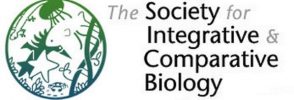Contents
DIZ Student Awards
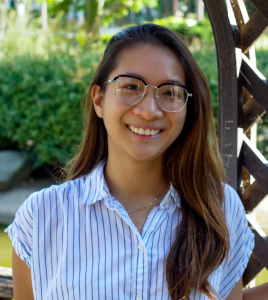
Congratulations to the student award winners from SICB 2022 in Phoenix!
The winner of the Mary Rice Best Oral Contribution is Emily Lau for “Here we glow again: Convergent evolution of substrate storage in fireflies and ostracods”
Emily summarized her research, conducted with her advisor Todd Oakley: How repeatable is evolution? We shed some light on this fundamental question by investigating luminous fireflies and ostracods, which produce light by using radically different enzymes to react with unstable substrates. Despite these biochemical differences, we found that fireflies and ostracods evolved convergent mechanisms to modify their bioluminescent substrates for storage. Our findings reveal how a complex trait, bioluminescence, convergently evolved from a mixture of similar and disparate evolutionary trajectories.
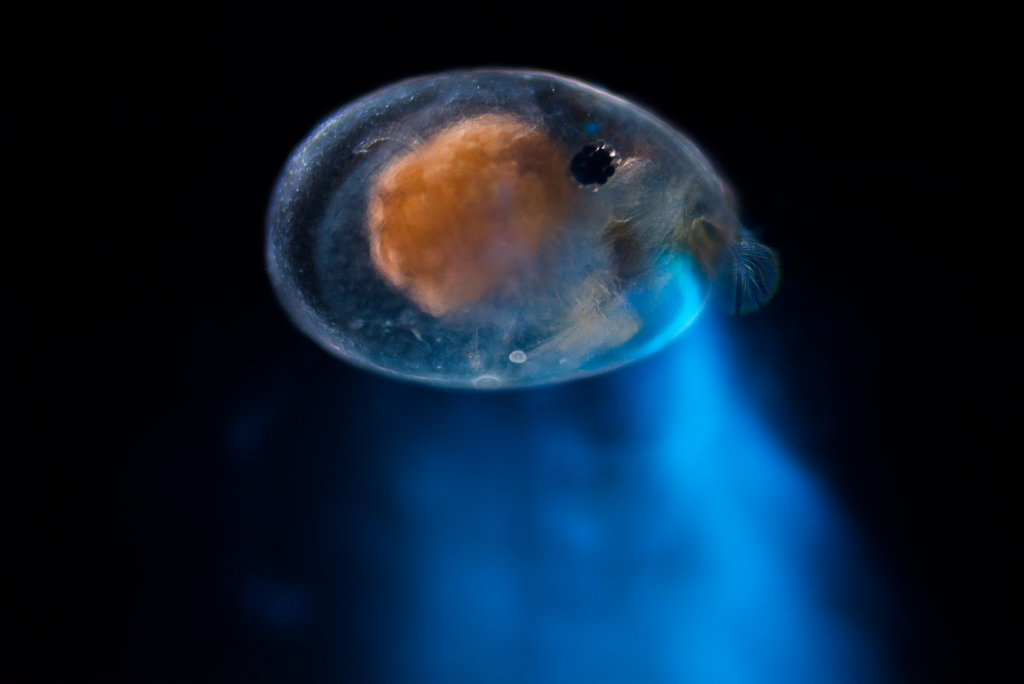
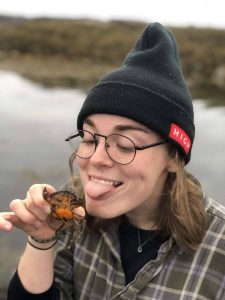
The winner of the Alan Kohn Best Student Poster is Erin-Darby McClain for “Frequency and success of larval clone production in the brittlestar Ophiopholis aculeata.”
Erin-Darby summarized her research, performed with her advisor Jon Allen: Brittlestars typically develop from an egg into a planktonic larva that settles to the bottom of the ocean as a juvenile and grows into an adult. My research, with my advisor Dr. Jon Allen, has shown that things are not that simple. The brittlestar, Ophiopholis aculeata, clones itself during the planktonic phase, releasing a larval arm that regenerates into another larva! Brittlestar larvae also clone just before metamorphosis, dropping a pair of larval arms or just one arm that regenerate into a new animal. The complex life history of brittlestars gets even more complex by the addition of distinct modes of cloning.
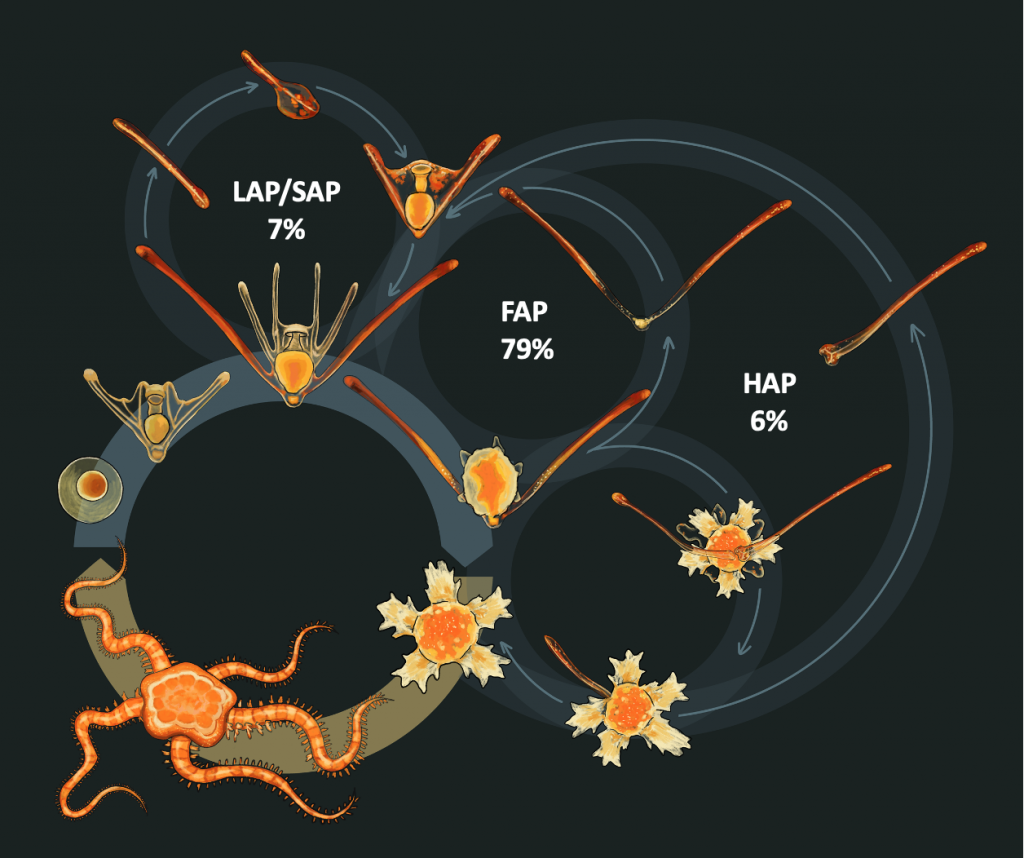
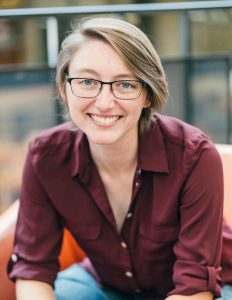
The winner of the Adrian Wenner Strong Inference Award is Bridget Steiner for her poster, “Variable expression of food-conditioned phenotypic plasticity in feeding larvae of diverse echinoderms.”
Bridget summarized her research, conducted with her advisor Bruno Pernet: It’s well known that pluteus larvae of echinoderms develop longer feeding ciliary bands when food is sparse compared to when it is abundant. We know much less about this phenotypic plasticity in “dipleurula” larvae of seastars and sea cucumbers. Prior work on the mechanisms underlying plasticity suggest that dipleurulae should be less prone to plasticity than plutei. Surprisingly, in my study I found that dipleurulae (3 species) displayed plasticity more frequently than plutei (4 species)! This led me to rethink assumptions about the relative cost of supporting each form and the frequency of these plastic responses in nature.
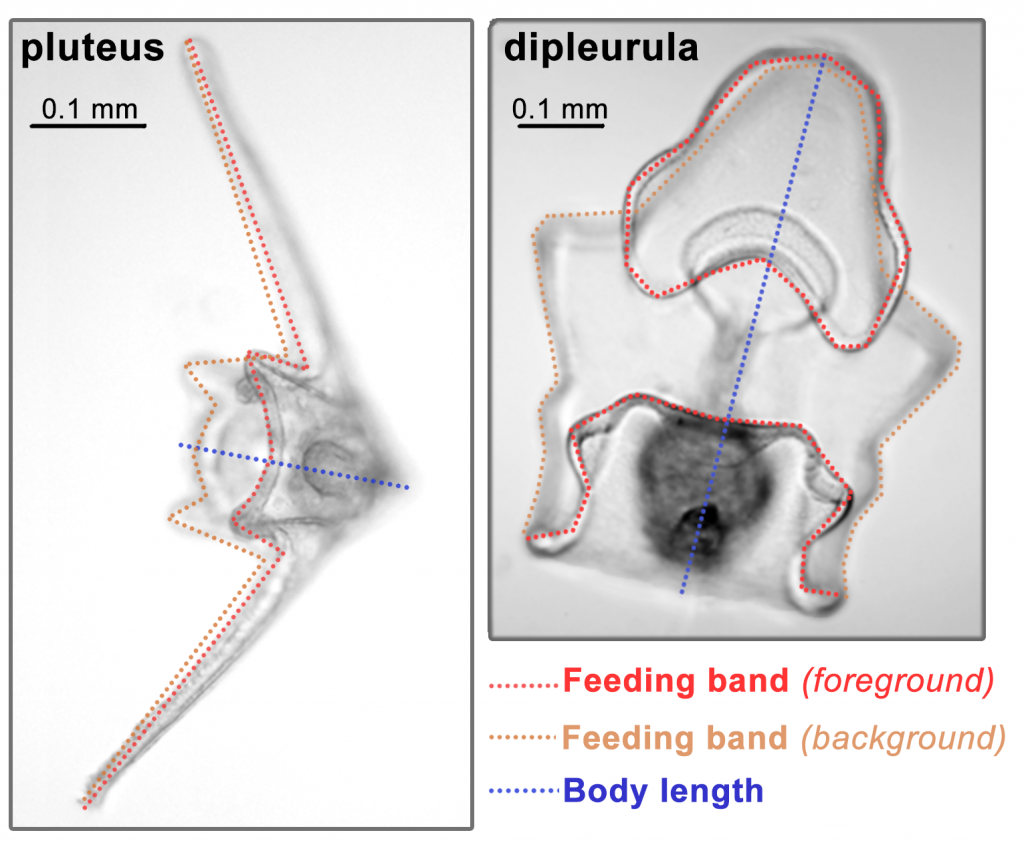
Message from the Chair
Jon Allen, Chair.DIZ@sicb.org
Dear DIZ,
Greetings! As I prepare this message, I am getting ready to take a group of 12 undergraduates on a spring break trip to the University of Washington’s Friday Harbor Laboratories for their first field experience collecting and studying marine invertebrates. I can’t think of a better way or place to engage the next generation of invertebrate biologists. I don’t know what we will find, but I know that getting into the field and seeing the tremendous biodiversity of the intertidal will be a life altering experience for them. I am so grateful to be able to travel with students and take them out into the field again.
I am also grateful that I was able to attend the annual SICB meeting in Phoenix in person. The entire leadership of DIZ was able to be there, which was not the case for many divisions. The ability to talk science and socialize with so many familiar DIZ faces was a real highlight of the winter for me. I hope that all of you were able to participate in SICB+ if you weren’t able to be there with us in Phoenix.
One of the bittersweet parts of the meeting is that it marked the official end of Justin McAlister’s term as DIZ secretary. Justin was a fantastic secretary for us and I want to thank him again for serving. This newsletter marks the first prepared by our brand new secretary, Kelly Dorgan. Kelly has already proven to be adept at her job and is thinking creatively about ways to streamline and otherwise improve our divisional newsletter.
Some news that you may have missed if you weren’t at SICB is that we decided to postpone the Libbie Hyman auction until January 2023 in Austin. This was a difficult decision, but the health of the fund in general (see Abigail Cahill’s report for details) and the uncertainty surrounding meeting attendance meant that this was the best option. Thanks to Bruno Pernet and Anna Klompen for the work they did to pull things together for 2022. I hope we can rely on them to pull the auction off in 2023 instead.
Another item from the DIZ business meeting is that, as a division, we made some decisions about discretionary funds that have been accumulating in our coffers. First, we are contributing $1000 to the Hyman Scholarship fund. The Hyman fund is in excellent shape, but the division has decided over the years to help build the endowment of the fund when we have funds available. Second, we are also contributing $1000 to the newly established John Pearse fund for student research (https://sicb.org/awards/named-student-research-awards/). This contribution will ensure another year of the award can be made (the first was made in 2021). If the award reaches donations of $20,000 then the named award can be given in perpetuity. If you would like to contribute to the new fund and help us reach the goal of making this award something that occurs annually going forward, please reach out to me or Brett Burk (ExecDir@sicb.org). Even with these donations, DIZ has considerable discretionary funds remaining at our disposal. If you have suggestions or ideas for how to make use of these, please reach out to me. I am very pleased we were able to contribute to the Hyman and Pearse funds this year.
Lastly, it is election season! We have two excellent nominees to replace Karen Chan as Divisional Program Officer. Karen will serve through the end of the 2023 meeting, which means we need to vote this spring on a new program officer to learn the ropes from Karen and take over next January. The two nominees for this year are Dr. CJ Brothers at Walla Walla University and Dr. Adam Reitzel at UNC Charlotte. Both CJ and Adam are familiar faces at SICB, but you can learn more about them and their backgrounds at the end of this newsletter. We are always looking for new folks to get involved in DIZ leadership. If you would like to be considered in the future for a nomination, please let me know!
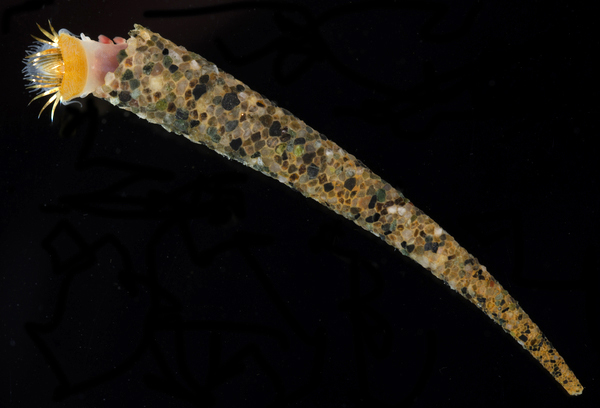
Message from the Program Officer
Karen Chan, DPO.DIZ@sicb.org
It was wonderful to see your friendly faces in Phoenix and online during SICB 2022.
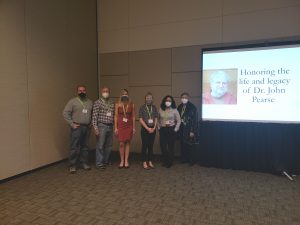
We celebrated the life of John Pearse in a special contributed session. Vicki Pearse even graced our presentations via Zoom. Furthermore, I would like to lift up our amazing student contestants in the best student presentations and thank the judges. You can learn more about the winners’ work in this newsletter.
Now, allow me to introduce you to the exciting symposia we have planned for SICB 2023 in Austin. We are supporting three society-wide symposia. They are “Sexual diversity and variation,” “Visions for a diverse, inclusive & safe future for field biology,” and “Large-scale biological phenomena arising from small-scale biophysical processes.” I am sure they will be wonderful because yours truly is organizing one of them (how shameless). We are also supporting two additional symposiums on “Neuroethology in the age of gene editing: New tools and novel insights into the molecular and neural basis of behavior” and “Genomics of marine larval evolution and development.”
If you are interested in organizing a symposium of your own, the proposals are usually due in late summer. I am happy to talk to you and guide you through this process. It is a wonderful opportunity to move your field forward.
I look forward to seeing you in Austin in Jan. Till then, stay safe and take care.
Message from the Secretary
Kelly Dorgan, secretary.diz@sicb.org
Dear members of DIZ,
In my first newsletter as DIZ secretary, I would love to be able to tell you all what a great time I had at the meeting in Phoenix. But unfortunately, I was one of the many who cancelled my trip at the last minute due to COVID concerns – in my case, a kid too young to be vaccinated. Disappointed and desperate for some science-y socializing, I road-tripped to the Florida Museum, where Jenna Moore and I spent a couple of days trying to make some sense out of CT scans of the jaw structures of Eunicidan polychaetes (which she described in her talk on SICB+). We may not have solved all of the mysteries of how these weird jaws work, but I at least returned home refreshed and ready to face a few more zoom meetings. I hope those of you who were fortunate to go to the meeting also found some joy and inspiration in science-y socializing and trying to solve the many mysteries in the invertebrate world.
I want to thank the outgoing DIZ Secretary, Justin McAlister, for his service to SICB, and on a more personal note for sharing his experience with me and making the transition so easy. Justin also took notes at the DIZ members meeting – please check out the minutes from that meeting here.
Please contact me if you have any news to share, and I’ll be happy to pass it along to our members. I’m also always looking for good invert photos to include in the newsletter, so if you have any good photos to share, send them my way!
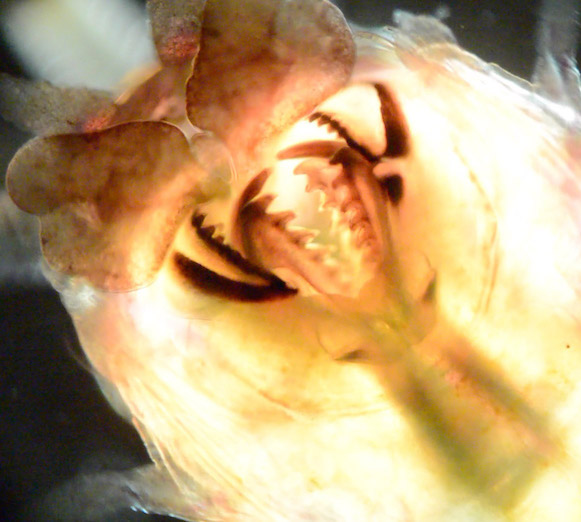
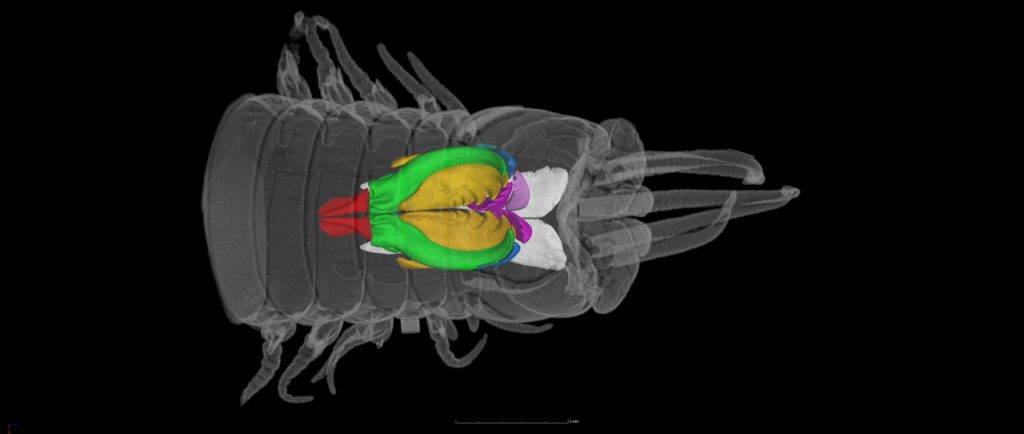
Message from the Student and Postdoctoral Affairs Committee Representative
Rebecca Varney
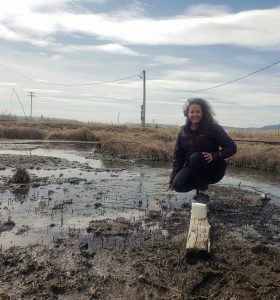
Science is ramping back up, it seems! Many of us just got fieldwork approved for the first time in years and boy did I miss being covered in mud, getting strange looks from tourists! I just returned from a whirlwind trip through California, collecting ostracods and looking forward to experiments to run back home. I made it without falling headlong into a hot spring, which is the real accomplishment. My department is abuzz with students and postdocs running around the world, trying to grab the samples they’ve been waiting for. But despite my campus lifting mask mandates, I’m heartened by how many people keep wearing masks, keep getting tested, and most importantly, defend the choices of others who are still choosing caution.
I know that I speak for many of us when I say that attending SICB2022 in person was a relief, but by no means a signal that COVID is ending. All participants this year made conscious decisions about risk – how much risk was acceptable, and how to behave relative to that risk. I am grateful that organizers launched a hybrid conference, so my colleagues with young children could still see talks and chat with scientists. I am equally grateful that while in Phoenix, most participants were understanding of one another’s choices. If there is something that we can carry forward from COVID, I hope it is this understanding.
We return to campuses that are lifting mask mandates and filling classrooms again. I hope that we biologists can be calm voices that remind everybody that each person has a right to decide what they feel comfortable with. COVID is not over, but more importantly there are other critical issues that may make people feel more and less safe in some situations. As we turn to the next conference, we should keep this in mind, and strive to be as understanding of any fears as we have been of COVID. That’s what makes SICB such a special conference; it is a community of scientists, not just a meeting.
I’ll be stepping down as student/postdoc rep this year but will still be part of DIZ. Thanks to all of you who reached out with questions, concerns, and comments over the past few years. Getting to know my peers better has been the best part of serving in this position, and I hope we will continue to support each other, whether by mailing snails or speaking up in meetings. And when you get back into the field, or the greenhouse, or the aquarium room, for the first time in ages, take a minute to be grateful that we all get paid to play with jellyfish, count isopods, race annelids, and admire lobsters. Stay cautious, stay hopeful, stay nerdy, and keep doing the amazing science that defines our division.
Message from the Libbie Hyman Scholarship Selection Committee Chair
Abigail Cahill
Hello and greetings from my first full cycle chairing the committee that oversees the Libbie H. Hyman Memorial Scholarship. Applications for the 2022 cycle were due in early February, and were reviewed by a four-person committee: Drs. Erika Iyengar, Will Jaeckle, Bob Podolsky, and myself. We received a relatively large pool of strong applications, and were able to award funds to two recipients for in-person field station experiences during the 2022 summer field season.
We awarded a scholarship to Uzuki Horo to support participation in the Evolutionary Development of Marine Invertebrates course at the University of Washington Friday Harbor Laboratories. Uzuki is an undergraduate at MIT, working in the lab of Dr. Adam Martin. He hopes to apply advanced molecular techniques to questions in evolutionary developmental biology in diverse animal taxa. He has trained in genetics and cell biology through research opportunities at MIT, but lacks exposure to animal diversity. The course is the perfect opportunity for Uzuki to fill this gap through the observation of the diversity development and life history strategies across animal phyla.
We awarded a scholarship to Isabel Pen to support participation in the Biodiversity and Integrative Taxonomy of Invertebrates course at the University of Washington Friday Harbor Laboratories. Isabel is a first-year Ph.D. student at The Ohio State University, working in the lab of Dr. Meg Daly. Her work looks at the systematics of sea anemones, but she has never had a chance to see and work with these animals in a field setting. The course will be an opportunity for her to examine the breadth and taxonomic diversity of invertebrates on location at the Friday Harbor Lab field station.
Congratulations to Uzuki and Isabel – I look forward to reading their reports in the fall newsletter. I would also like to acknowledge Sofia Meléndez Cartagena, whose application was chosen by the committee but who ultimately was not able to accept the funds. (The knock-on consequences of COVID continue, unfortunately.)
Thanks are due to all of the reviewers for their thoughtful work, and to SICB Webmaster Ruedi Birenheide for his help with the webpage and applications.
Thanks also to all of you for your continued financial support of the Hyman Scholarship Fund through your generous donations. The Libbie H. Hyman Award provides funding to support the first significant field station experience for advanced undergraduates or early career graduate students pursuing coursework or research on invertebrates. This first field station experience is typically a transformative period in the career and life of a student. Field station costs are ever-higher, and the scholarship makes a real difference to students. To make a contribution to the fund, click on ‘Donate to SICB’ on the SICB home page (http://sicb.org) or send a check to the address below.
SICB Business Office, Libbie H. Hyman Memorial Scholarship Fund, 950 Herndon Parkway, Suite 450, Herndon, VA 20170 USA
Checks should be made payable to SICB and marked as a “Contribution to the Libbie H. Hyman Memorial Scholarship Fund.” All contributions are tax deductible.
Candidates for Divisional Program Officer
C.J. Brothers
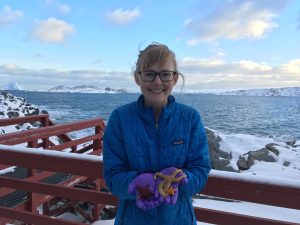
Current Position: Assistant Professor of Biology, Walla Walla University (WWU; 2018–present)
Education: B.S. & M.S. in Biology, WWU (2010 & 2012); Ph.D. in Biology, University of Alabama at Birmingham (UAB; 2016)
Professional Experience: Visiting Scholar at the University of Sydney (2014); Visiting Instructor at the US Air Force Academy (2017); UAB Collaborating Researcher at Palmer Station (2018)
SICB Activities: Member since 2014; Student poster judge for DIZ & DEDE
Other Memberships: American Academy of Underwater Sciences Scientific Diver
Research Interests: My research focuses on the physiology, ecology, and health of marine invertebrates in coastal area rapidly being affected by climate change and other anthropogenic stressors. Most recently, I am interested in characterizing the microbes associated with sea urchin populations and determining the stability of the host-microbe interactions in response to disturbances.
Statement of Goals: DIZ has a strong history of student involvement, integrative research, and collaboration between primarily undergraduate and research universities. My goals are to (1) prioritize involving students at every level of SICB programming, (2) keep participants numbers in DIZ growing, and (3) continue the work that Karen Chan and others have put into record-keeping and organization.
Adam Reitzel
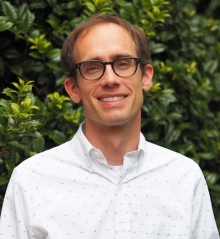
Current Position: Professor, Department of Biological Sciences, University of North Carolina at Charlotte
Education: B.A. Illinois Wesleyan University (1999); M.S. University of Florida (2002); Ph.D. Boston (2008); Postdoctoral Scholar Woods Hole Oceanographic Institution (2008-2012)
Professional Experience: Assistant Professor, University of North Carolina at Charlotte (2012-2016); Associate Professor, University of North Carolina at Charlotte (2016-2020); Full Professor, University of North Carolina at Charlotte (2020-Present), Co-Director, Center for Computational Intelligence to Predict Health and Environmental Risks (CIPHER), University of North Carolina at Charlotte (2022-Present)
SICB Activities: Member since 2000, Poster and Oral Contributions Judge for DIZ at annual conferences, Co-Organizer for 2013 Symposium “Keeping time during animal evolution: conservation and innovation of the circadian clock“ (DCPB, DEE, DNB, DIZ, AMS).
Other Memberships: Sigma Xi, Society of Molecular Biology and Evolution (SMBE), Society for the Advancement of Chicanos/Hispanics and Native Americans in Science (SACNAS), Black Doctoral Network
Research Interests: Mechanisms of environmental response in marine invertebrates; comparative genomics; animal-microbe interactions
Statement of Goals: I am interested in serving as the Program Officer for DIZ to promote the long standing successes of the Division and its role in promoting the interdisciplinary research integral to the Society. Invertebrates are incredibly diverse and thrive in all parts of the world. Through the expansion of sampling, culturing, molecular and ‘omic techniques, DIZ has an important role in supporting and promoting the work on these endlessly fascinating organisms from base pairs to the abyssal plain. SICB broadly and DIZ specifically have been my society “home” for 20 years. My first presentation at a conference was at SICB and it has remained my favorite conference ever since. I have always appreciated the focus on student success and opportunity that continue to grow each year. The annual conference is the place where so many nerds-for-invertebrates get together to share their ideas and research, build community, and forge new networks. As Program Officer for DIZ I would look forward to working with the rest of the executive committee and the community to continue the support of unique, engaging symposia at the annual conference. I would also be excited to contribute ideas and efforts to expand the financial support for student researchers to attend the SICB conference and to pursue unique research experiences. Lastly as the Program Officer I would also work with the existing DIZ community to expand our collective reach and include more members through connections with other Divisions as well as the broader scientific community that may not currently participate in SICB.
